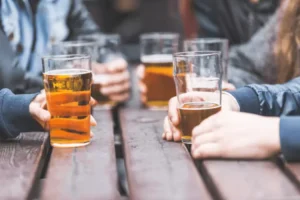Top Foods to Avoid While on Blood Thinners for Safe Treatment

Their use must be carefully monitored to ensure that the blood does not become too thin. As many as three million people take blood thinners each year, but some may not be aware of how these medications interact with substances like alcohol. On their own, blood thinners can create a number of health risks and increase the chances of serious bleeding. When combined with alcohol use, however, the risks become much more severe. Despite their name, blood thinners (also called anticoagulants) don’t actually thin your blood.
Participating in risky activities

With the right guidance and a commitment to https://ecosoberhouse.com/ consistency, you can confidently navigate your treatment journey. Always prioritize your health by consulting with your doctor or dietitian for expert advice. Alcohol can also alter the time it takes for your body to break down your blood-thinning medication which means it can stay in your system for longer.
Understanding the Side Effects of Blood Thinners
When you get hurt, blood cells called platelets gather at the injury site and form a blood clot. Clotting factors are also released from platelets that help form a mesh to form the plug to close the wound. This is doubly dangerous, as you are more likely to have an injury while intoxicated and are at higher risk for severe bleeding. This can help them determine if something is causing an interaction that could lead to serious bleeding. Like vitamin K, these all contain compounds that can counteract the good things that blood thinners do.

Are All Blood Thinners Anticoagulants?
Research has found that alcohol affects the process of blood coagulation. “Coagulation” is a term used to describe the process of blood cells known as platelets sticking together. When a person experiences an injury, those platelets travel to the area to form together into a blood clot to stop the bleeding.
Why Certain Foods Can Interfere with Blood Thinners

Additionally, alcohol can alter the time it takes for the body to break down blood-thinning medication, affecting its efficacy and interfering with the dosage. If you drink more alcohol than recommended and take blood thinners, you are at risk of haemorrhaging. It is important to speak with a healthcare provider before drinking alcohol while taking blood thinners and to monitor for signs of bleeding. Both types of medications can increase the risk of bleeding if you drink alcohol while taking them. When on blood thinners, Sobriety it’s crucial to avoid foods that can interfere with the medication’s effectiveness or increase bleeding risks.
Can someone drink alcohol instead of taking a blood thinner?
Blood thinners, medically known as anticoagulants, are a group of medications that help prevent blood clots. These clots can block blood flow to vital organs, leading to potentially serious medical conditions like strokes and heart attacks. Blood thinners are commonly prescribed to individuals with certain heart conditions, after certain types of surgery, or for those who have a history of blood clots.
- Blood thinners, such as warfarin or newer anticoagulants, are prescribed to prevent blood clots that could lead to strokes, heart attacks, or other serious health issues.
- Firstly, alcohol is itself a blood thinner and can affect how well blood clots.
- Visit us today to discover how our personalized care can make a difference in your treatment journey.
- The effects of Xarelto can be affected by alcohol, and those taking the medication should limit the amount of alcohol used.
Can You Drink Alcohol With Elquis?

However, people should not consume alcohol instead of taking medications as a healthcare professional has prescribed. Additionally, a person should discuss whether they are able to consume alcohol while taking blood thinners, as alcohol may interact with some medications and lead to side effects. Yet because of this effect, drinking alcohol could potentially increase your risk for the bleeding type of strokes — especially when you drink it in large quantities. Alcohol use — especially in excess — can also pose other risks to your health. People taking blood thinners with reduced liver function may accumulate more medication in their bloodstream. Increasing the level of blood thinners in the body can lead to an increased risk of bleeding.
- Blood thinners, or anticoagulants, are medications that prevent blood clots, and alcohol can interact with these drugs, potentially leading to increased bleeding risks.
- Key foods to watch out for include those high in Vitamin K (like spinach and kale), citrus fruits like grapefruit, alcohol, and certain herbal supplements such as turmeric and ginseng.
- A 2016 review suggests that significant daily alcohol consumption increases the activity of platelets.
- Short-term, you can expect an increase in blood pressure and higher cortisol levels.
- Moderate alcohol use is generally safe while taking most blood thinners.
- Moderate alcohol consumption, on the other hand, does not appear to have a considerable impact on Warfarin’s function.
- In addition, some direct-acting oral anticoagulants are broken down in the liver for excretion.
Blood Thinners and Alcohol: Interactions, Risks, and Side Effects
Alcohol should be avoided when taking Coumadin, as it is one of the most serious risk factors for complications with this medication. Regardless of the blood thinners and alcohol type of blood thinner being used, you should generally avoid alcohol while taking a blood-thinning medication. The actual risks to a particular individual are very case-specific and should be discussed with a doctor. It’s relatively safe to consume alcohol as long as you’re in good overall health and have confirmed with a healthcare professional. It can also limit your kidneys’ ability to excrete broken-down toxins or drugs, such as your prescribed blood thinner. This can lead to the same harmful effect of excessive anticoagulation.

